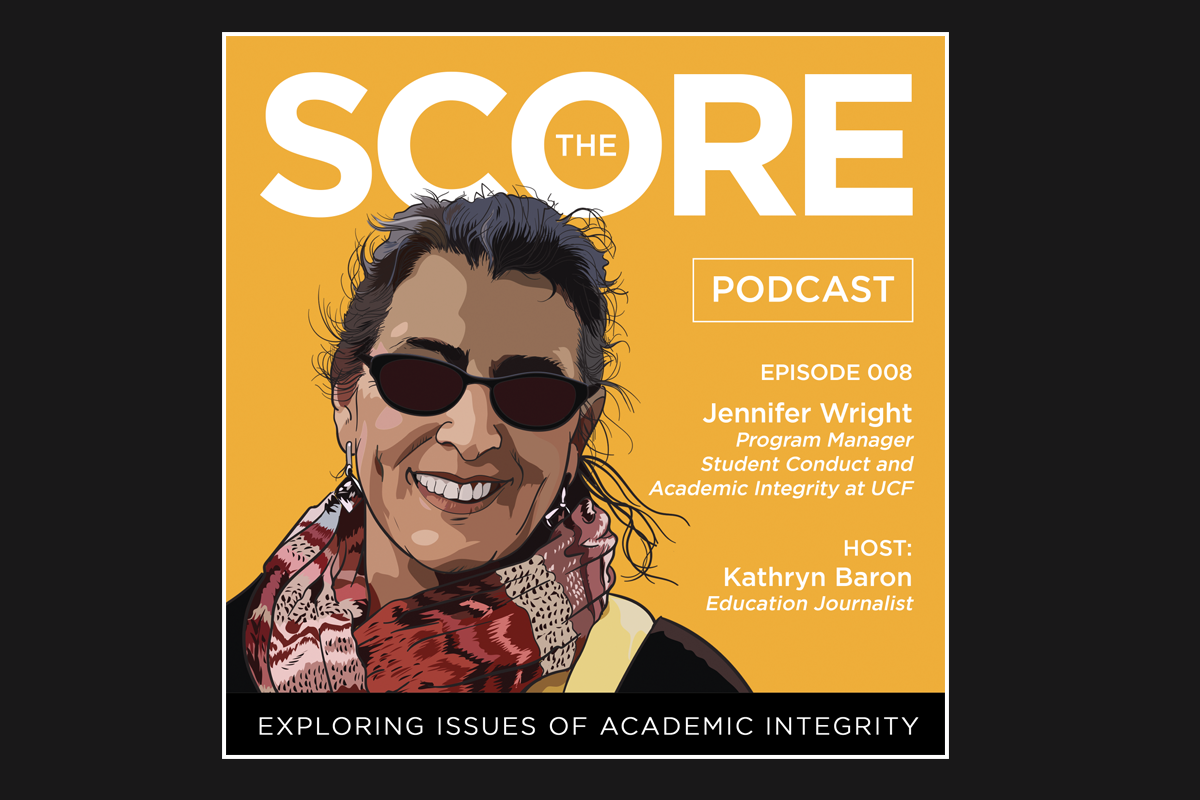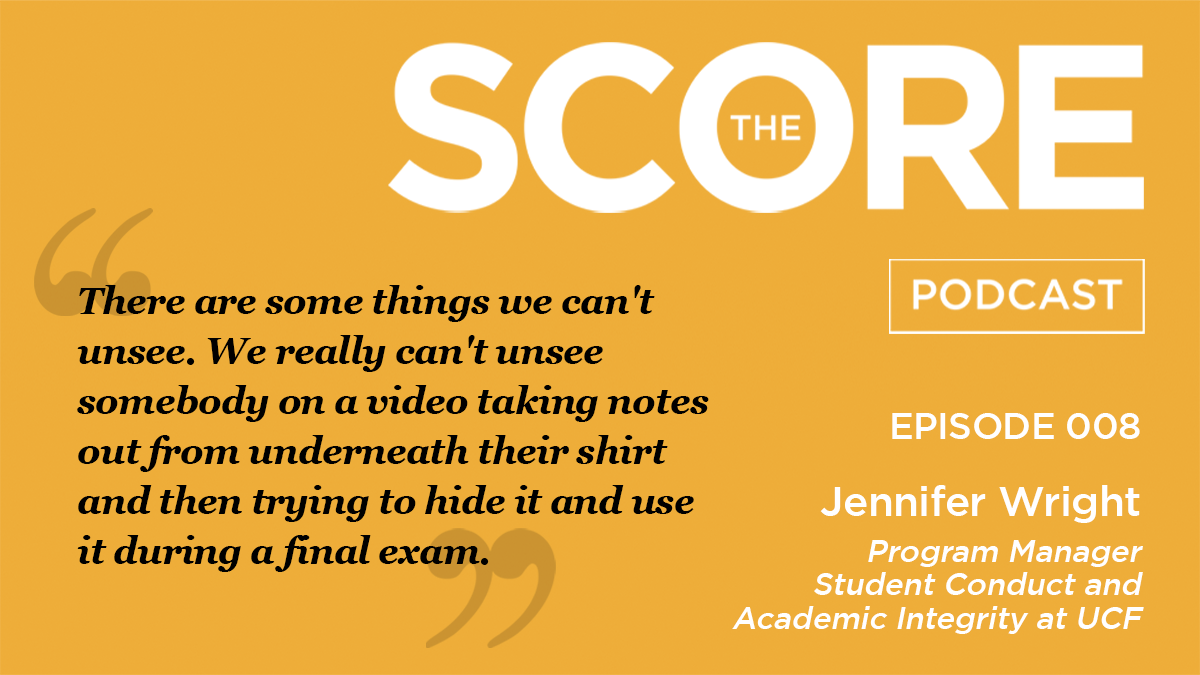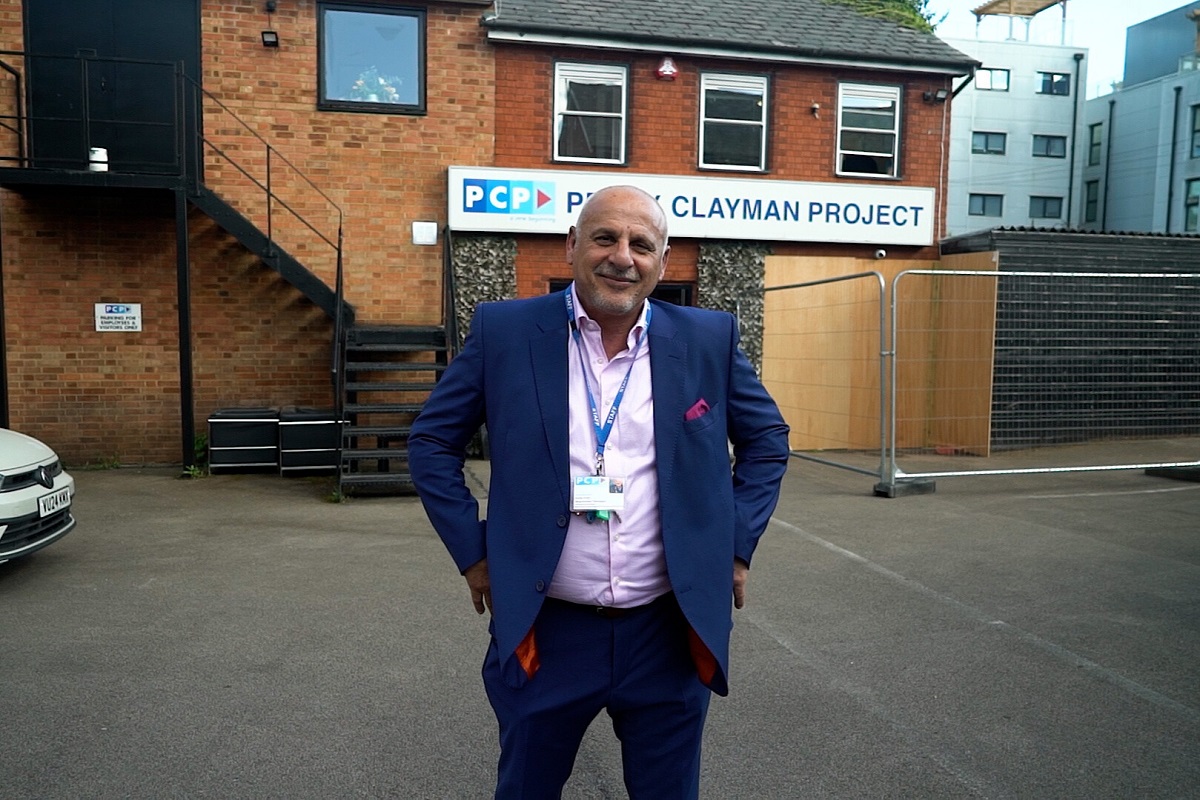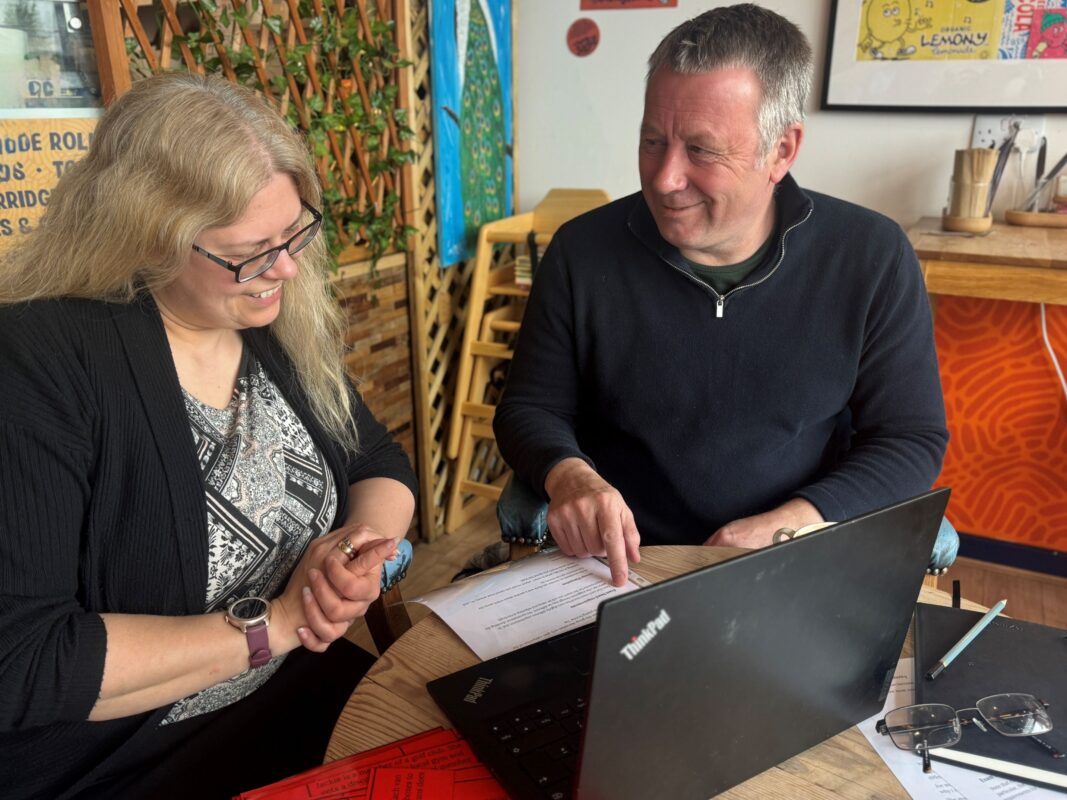Discussion of UCF’s Take the Zero Campaign on The Score Podcast

Episode 008 of the academic integrity podcast The Score features Jennifer Wright with the University of Central Florida. Wright helps facilitate workshops and seminars on ethical decision making and is Program Manager of Student Conduct and Academic Integrity in the Office of Student Rights and Responsibilities. She has been working on academic integrity issues and initiatives at UCF for nearly 12 years.
Host Kathryn Baron (@TchersPet) and Wright discuss the simple but effective “Take the Zero” campaign from UCF in the episode that was released last spring.
High points of the conversation follow. Listen to the full episode Apple, Spotify, and The Score Website. Note: Removal of filler words and minor edits have been made for clarity.
Kathryn Baron (03:11):
Tell us what is the Take the Zero campaign and where did you get the idea for it? Also, how does it address the question of what makes students cheat?
Jennifer Wright (03:55):
I was talking with one student, and then I said to them, “Well, what have you reflected upon this? What has been your big ‘aha’ moment from this?” They said, “If I had just taken the zero, I wouldn’t be talking with you.” And I went, “I can do something with that.” That just had a spark in me. I wrote it down immediately in my notebook. From there, I started to play with it and I brought it to my colleagues and tested it out with some of our great student assistants and people like that.
Jennifer Wright (05:50): I have a workshop also that I do that is called Bs and Cs Get Degrees. And again, it’s not easy for students of today to go ahead and get a C, take a zero. It’s interesting how they have the ways of looking at that zero on a 10-point quiz and manifesting it to, “I can’t be a doctor. I can’t become a lawyer. My parents won’t be proud of me. I’m going to let my siblings down.” Zero out of 10 will move a student to go, “It’s all over.” I’m trying to get that concept across to them that it is okay.
Kathryn Baron (07:54):
Are they upset that they did it, or are they upset that they got caught?
Jennifer Wright (07:58):
There’s a lot of shame that’s associated with this. They are very upset with themselves. They can’t believe they have done what they chose to do. There’s a couple of students every now and then that I will have that kind of thought process, depending on the sentences they say, where I’m kind of going, “Are you just sorry you got caught like this?”
But I can tell you because there is not a week that goes by that I don’t meet with a student and I don’t have somebody who is literally crying about what has happened, and that release they do a lot with me. Yeah, they do admit to it. They get it. There’s no other way because they were there when it happened. They can’t blame it on anybody else.
Kathryn Baron (14:17):
Jennifer, what are the sanctions for students who are found to have cheated? Do they vary based on the type of cheating? Do some hold more weight than others? Are the sanctions kind of across the board, or do professors have a lot of discretion on that?
Jennifer Wright (15:11): Because professors for a final grade are looking at student behavior over a 14-week period over a semester, we’re looking at one act that has occurred on a day. We’re determining the egregiousness of that act. And with that, we look at, what was the intent, what was the impact that it had, how many were involved, were other students brought into this, did other students benefit from a student committing academic misconduct?
With the Course Hero and with Quizlet, with Chegg and all of that, other students end up participating as well in that. We look at a lot of things with it to determine what the outcome will be in violation. We have six levels of violations, and they range from a warning to probation to deferred suspension, suspension, dismissal, and expulsion.
Kathryn Baron (16:24): You talked about intent. I kind of think of it as, what, premeditated cheating versus spur of the moment cheating.
Jennifer Wright (16:32): I look at it and say, “Was there enough of an opportunity or a moment where the student could have stopped what they were doing?” For example, if there was a student who paid another person to do their work for them, they are contacting somebody, getting it set up, changing usernames and IDs, giving them access, having a lot of conversations, that could have stopped at any moment. That person could have said, “Wait a minute here, what am I doing?” And could have stopped.
[If the student] continued it, that’s where it rises a little bit higher. A student who puts a cheat sheet together the night before, puts it in their pocket, walks with it to class, they could have just said, “I’m not going to take it out. Nobody would be the wiser,” but then you chose to take it out. We know what was going to happen there. Those kinds run to a higher level. I also engage with forgery as well, whether it’s a medical document or forgery of an email to try to get out of taking an exam or getting an extension on an assignment. We’ve had that before. Forgery, you knew what you were doing. You know it’s not your name that you’re signing. Those kinds of things rise to a higher level of it.
Jennifer Wright (18:45): Those of us in academic integrity lands, we really have a very, I do, and I know many of my colleagues do, have a very visceral reaction to Chegg and to other websites who their sole mission is to convince students that their sites are safe, good, and helpful, and nothing could happen. Nothing could happen if you use us. That’s not true.

Kathryn Baron (24:51):
You hold a lot of training for students and for faculty. I want to talk about the students. Do you find that they are relieved at all that the university is taking this issue to heart and doing something about it?
Jennifer Wright (25:07): I would say I think [students] are impressed [with what we do around academic integrity]. I think they are glad, because I do know and have heard from students that have said… It really, really bothers me when I see a student with a cheat sheet and nothing is done about it, or it really bothers me when somebody in my group will go ahead and text me and say, “I know you already took the exam. What were some of the questions?”
Kathryn Baron (29:43):
How big is your office, the Office of Student Conduct and Academic Integrity? It can’t be one person doing all this, is it?
Jennifer Wright (30:34): I think one of the things that has really helped is we have dedicated somebody, myself, to just academic integrity. We have 20 rules of conduct at UCF. I specialize in one of them. That’s all I do, it is just the one. I don’t work with students who are coming in for alcohol or drugs or something else, anything that’s going on in the residential halls or anything like that. I don’t handle any of those cases.
I’m specifically academic integrity, so that helps. I think that has been a great win. I’ve been able to focus greater in that, in not having to go, “Oh, today I’m working with somebody who cheated on an exam, and then I’m working with somebody who had marijuana in the residential hall, and then I’m working with somebody with a fake ID,” and all of that. It’s really been helpful to specialize in it. That’s what my role is.
Jennifer Wright (36:03): Their questions are… And again, I understand, but I also correct, where they’ll say, “I don’t want to be the one to upend a student’s life and career.” I always say back to them, “I understand that. You had nothing to do with it. This was the student’s choice to do what they did. You could have been standing behind them in their residential hall, over their shoulder and saying, ‘Don’t do it. Don’t do it.’ If the student wants to do it badly enough, they’re going to do it. You don’t have anything to do with this.”
Jennifer Wright (36:50): There are some things we can’t unsee. We really can’t unsee somebody on a video taking notes out from underneath their shirt and then trying to hide it and use it during a final exam. I can’t unsee what I’m looking at.
Kathryn Baron (37:22): So, you’ve seen that?
Jennifer Wright (37:23): Yeah. Oh yeah. Many times. Many times.
Kathryn Baron (37:47): What’s the worst thing you’ve had, just for fun?
Jennifer Wright (37:50):… We’ve had one case of a student who had another student go in and pretend to be them and take an exam for them. The other one would be the student who paid another individual to complete their coursework for them. You’ll sit there and go just, “When I think I have seen it all, something else will come up.” And I’ll go, “This is a new one. Okay, let’s see how this plays out.”
Jennifer Wright (38:46): Students will say, and I understand, they’ll say, “Trust me, Ms. Wright. I’m never going to do this again.” I am never really concerned about them actually doing the exact same act again. What I say to them is, “Good. I’m glad to hear that. But what I want to address with you is there was a moment in time where something got the better of you, and it just happened to manifest itself into looking up an answer on the internet to finish a quiz. There’s going to be other times where something is going to get the better of you, whether that’s in your career, in relationships, whatever it happens to be. But how are you going to handle the integrity piece?” I kind of take the academic part out, and then I focus on the integrity piece. “How will you react if a supervisor comes to you and you were just hired right out of graduating from UCF and they say to you, ‘We got a big report coming up. I know you’re responsible for these numbers here in our report. Make them dance for me. Make it happen. We have to look really good to our stakeholders. Whatever you got to do. Don’t worry about it. I got your back. I’ll take care of you, but please make those numbers look good for our meeting.'” Well, that’s not right. How are you going to handle that? That’s where I hope in just starting some awareness on these topics that students will not only take it when they’re doing their academic work, but also take it for life. That’s for sure.
Jennifer Wright (44:56): I would say my greatest piece of advice [for schools] is if you can designate a person, a team, a department that just focuses on academic integrity, I think that is one of the best things you can do, because then you’re having people specialize in what is happening. You’re having people day in, and day out be around students that this has happened to and hear from faculty of what their frustrations are in this area.
Listen to the entire episode 008 of The Score with guest Jennifer Wright here.











Responses